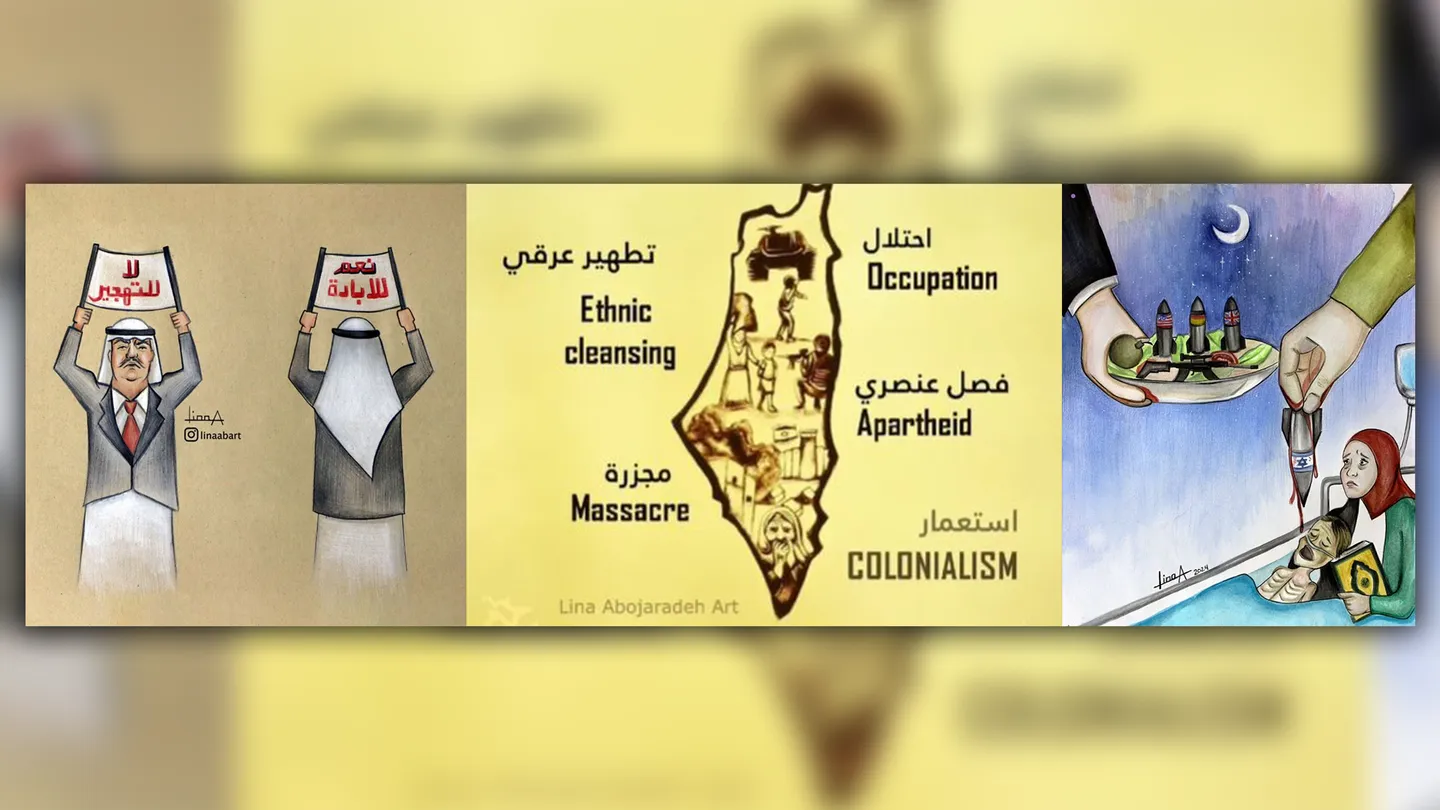At the vibrant fourth edition of the annual NEXT 2025 organised by TRT World Forum in Istanbul on Saturday, a quiet but powerful voice pierced through — that of Lina Abojaradeh, a Palestinian artist, poet, and activist whose art speaks the language of resistance, resilience, and radical empathy.
“For the past 15 years,” Abojaradeh tells TRT World, “I've been using art as a form of resistance in order to tell the story of myself as a Palestinian — and the struggle of all oppressed people around the world.”
Abojaradeh’s work spans poetry, murals, comics, and other multimedia forms that transcend barriers of language and geography to reach people at a deeply emotional level.
The legacy of resistance in poetry and paint
Citing a prophetic tradition, Abojaradeh draws a historical line between her work and the spiritual legacy of defiant art. “I believe that the greatest person was Prophet Muhammad (Peace Be Upon Him), and he said ‘ahjuhum’ (اهْجُهُمْ) to [his companion] Hassan bin Thabit — which meant fight them with your poetry.”
Bin Thabit was a master Arab poet best known for poems in defence of the Prophet.
She continues, “A picture speaks a thousand words. This is part of our legacy — to use words and artwork in order to fight oppression.”
In an age overwhelmed with headlines and statistics, Abojaradeh believes that art uniquely compels people to pause. “When you use a piece of painting or an artistic process in a way that evokes empathy, I think it hits harder than if you simply hear a death toll or see a headline on the news,” she explains.
“Art gives us a space to stop. To feel. To recognise the humanity in the people suffering.”
Born with a purpose: A Palestinian identity
Her identity is at the heart of her journey. “I think it’s a privilege to be born Palestinian,” she says firmly, “because not only does it give me that strength and that smooth [conviction], but it allows me to see the world through an empathetic worldview.”
That empathy, she says, extends to other Indigenous and oppressed people. “Other indigenous people around the world are suffering just like Palestinians — under the same systems of oppression, under the same white supremacy. It made me aware, it made me in touch with global suffering — and how I can help alleviate that.”
When asked about hope in the midst of continued violence and displacement in Palestine, Abojaradeh offers a perspective grounded in historical continuity. “Some people are very limited in thinking this conflict started on October 7th, or even in 1948,” she notes. “This has been 100 years of Western colonialism — first British, then Zionist. What has kept us standing here today and speaking about Palestine is the work of artists in really keeping this cause alive.”
That, for her, is the essence of artistic resistance. “Artists evoke the fire and keep it burning for the next generation. Through my art, I need to pass these concepts, these values, this strength, so that they can continue until Palestine is liberated.”
Empowering refugees through creation
Through initiatives like ArchiSmile and Talaween, Abojaradeh channels her passion into action by working with refugee children across multiple countries. “Refugees haven’t just lost their land or home. They’ve also lost their sense of agency, their identity, and their ability to tell their own story,” she explains.
Her workshops aim to restore those narratives. “We transform them from people who think of themselves as less than, uncivilised, unworthy — into people who are strong, who are able to tell their own stories and make change. By using art, we give them that power.”
She smiles, recalling how these efforts grow into something bigger: “We really create leaders that will go on into the world and shout out their story with confidence.”
Having worked in over a dozen countries, Abojaradeh is often humbled by the universal resonance of her message. “It’s amazing to see someone completely unrelated to the Palestinian cause — someone who might not be Arab or Muslim — come up to me and say: ‘Your artwork made me cry. I really felt like I was experiencing this’.”
That, she says, is the transcendental power of art: “It connects across borders, across languages, across all types of barriers. We’re trying to thread together global suffering and evoke a global awareness where we all feel responsible — for a child in Gaza, for any person being oppressed.”
Reclaiming imagination, defying erasure
For Abojaradeh, the political dimension of art is undeniable. “Zionists have put millions and millions of dollars just to fight Palestinian narratives. They don’t just want to steal our land — they want to erase our history, our culture, our identity.”
Against that tide of erasure, art becomes not just a reflection, but an act of defiance. “By using artwork to say: I’m here, this is my story, and I will stay here until my land is liberated — that’s powerful resistance.”
And perhaps most profoundly, she calls for an act of collective reimagining: “What they want is to rewire our imagination. They not only changed our borders; they took away our sense of agency. So we need to go back to imagining not only who we are — but what we can be. And not allow anyone to take that from us.”
Lina Abojaradeh’s message — rooted in pain but brimming with possibility — is not just about Palestine. It is about how art can reclaim stories, empower the voiceless, and sow seeds of hope across a wounded world.



















